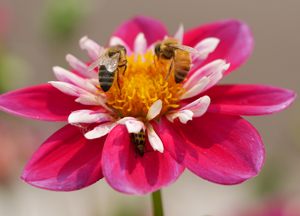
Photo by Don Latarski
By now, the whole world knows that seven documented bumble bee kill incidents happened in Oregon during 2013-2014. These bee slaughters were caused by applications of neonicotinoid insecticides. I described how the ground was littered with the convulsing bodies of bumble and honey bees. The total kill count, upwards of 100,000 bumble bees, did not include the honey bees, lady bugs, and butterflies that were poisoned, nor the bumble bees that attempted to fly away but probably died before reaching their home.
Just for the record, according to the Department of Agriculture, the pesticide applications involved four types of neonicotinoids applied using a variety of application methods, including: spraying directly on leaves, tree injection, soil drench and a basal bark treatment.
If you’re like me, you are very concerned about the survival of bees, not only in Oregon, but throughout the world.
Simply put, through their daily foraging, bees (and other pollinators) fertilize plants so that they grow and produce, thus providing over 30% of the world’s fruits and vegetables. Botanically speaking, bees pollinate 90% of wild plants that enrich our ecosystems. How tragic is their global decline! They are beautiful, hard-working, life-sustaining creatures. And they play a vitally important role in feeding humanity.
Please join me in the New Year in my wish to Save Oregon’s Bees. There are three specific actions you can take to protect bees!
1. Give Public Comment on Oregon’s New Proposal to Ban the application of four neonicotinoid insecticides on linden trees.
Yes, it is necessary to ban the application of neonicotinoid insecticides. While it is true that the seven bee kills in Oregon were caused by neonics being applied to linden trees, these were “acute” and very visible poisonings. What we need are regulations that address chronic, sub-lethal exposures of these poisons. Neonics cause devastating sub-lethal effects, including disruption of mating, foraging, digestion and care of young. Nor does the proposed rule address their biological longevity. To Save Oregon’s Bees and other wildlife, it is necessary to permanently ban all neonics.
Take Action: Learn more here and send your comments to the Oregon Department of Agriculture by January 21 or plan to attend the public hearing. Read the details->>
2. Help Beyond Toxics Help Your Community!
We are working with Oregon cities, big and small, to pass bans on using neonicotinoid pesticides on publicly-owned property. We started with Eugene’s ban in February this year and we are helping more communities in Oregon who are clamoring for the same protections. It is important to act locally to send a strong message to our state and national leaders.
Take Action: If you would like to help pass a Save Oregon's Bees ordinance in your home town, like we did in Eugene, please contact us: we will help you! If you don’t have the time to be a Bee Activist, but still want to be a Bee Advocate, please make a donation to our Friends of Healthy Bees program – it helps us help you make change happen!
3. Eat organic and support local, organic agriculture.
Did You Know? New research about neonicotinoid insecticides reinforces how our fate is bound with the fate of bees. A 2014 analysis published in the Journal of Agricultural and Food Chemistry found at least one neonic pesticide in 100% of tested fruits and vegetables that are common for human consumption.
Neonics are systemic poisons that are toxic to the cells in your body. We believe the concern about toxic effects of systemic pesticides extend to both bees and people. Indeed, this seems to be the conclusion of the authors:
“In light of the new reports on toxicological effects in mammals, our results strengthen the importance to assess dietary neonicotinoid intakes and the potential human health effects.”
A good way to reduce the harm from combinations of pesticides in ordinary foods, please eat organic.
Beyond Toxics is working to make organic food more affordable and accessible. Our project will help save threatened Class 1 farm soils and support family-sized urban organic farming, especially for working class families. Organic gardens make the best bee habitat too!
So, dear friends, I wish you all the best in 2015! Join me in making a New Year’s Resolution to Save Oregon’s Bees, Birds, Fish and …oh yeah, people too!. Take action, plant gardens, write comments and continue to care about bees! And if you can, please give generously as this year draws to a close to ensure the success of our important work in 2015!
Lisa Arkin, Beyond Toxics Executive Director
Dec. 30, 2014
RELATED LINKS:
Read more about the accomplishments of the Save Oregon's Bees campaign
Planning your garden for Spring? Learn about a few bee-friendly resources to consider:





